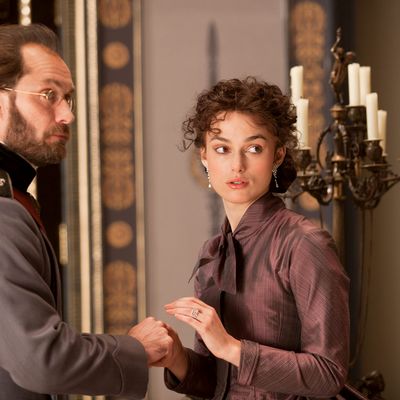
Every unhappy movie is unhappy in its own way, and Joe Wright’s Anna Karenina is as boldly original a miscalculation as any you’re likely to see. Wright has chosen to eschew naturalism (there have been plenty of straight Anna K versions, after all) and set Tom Stoppard’s adaptation of Leo Tolstoy’s 1877 novel primarily in a crumbling old theater.
The idea, I gather, is to bring out the decadent side of nineteenth-century imperial Russian culture and to illustrate a line from a book by historian Orlando Figes describing people in St. Petersburg high society as “living their lives as if on a stage.” So a curtain goes up and stylized groups of actors bustle about said stage or in the catwalks high above. They archly telegraph their snobbery or righteous disapproval. They freeze in place while a spotlight falls on Anna (Keira Knightley), the upright government official’s wife who swoons unto death for the radiantly handsome officer, Vronsky (Aaron Taylor-Johnson). Sometimes the actors attempt to establish a measure of psychological reality while the camera and scenery move operatically around them—a difficult task. This is not, to be clear, a filmed play. The space opens up and out, color palettes shift, settings elide. Wright’s transitions can be delightfully unfettered, but they tend to upstage the scenes in between. It’s a tour de force in the wrong direction.
Wright’s stylization could have worked, I suppose. The late Raúl Ruiz’s entrancing Mysteries of Lisbon unfolded on what looked like a sumptuous puppet stage, with periodic cuts to a literal one to suggest that we were inside the dream of the puppeteer hero. And artifice intensified the emotions in another female-infidelity picture, Terence Davies’s The Deep Blue Sea (one of the year’s best films). But Tolstoy doesn’t lend himself to Wright’s particular fussiness. The most deceptively plain of the great Russian novelists, he weaves evocative details seamlessly through the action, slipping insights in so gracefully that you almost think they’re yours and not the author’s. Framing Anna Karenina this way is fatally distancing—it’s Brechtian Tolstoy. And it’s bewildering—it never establishes a context for itself.
Knightley works very hard to portray Anna as a woman who has never felt romantic love and once she does flaunts it openly, naïvely thinking there will be no repercussions. But she’s almost neurotically overeager, champing at the bit to do a Lucia di Lammermoor madwoman turn, never establishing a plane of normalcy. Knightley might be the most effortful leading actress in movies. When her Anna becomes possessive of Vronsky, she squints her eyes and works her big jaw, her fanged upper teeth threatening to swallow the camera. This very lovely young woman becomes hard to look at—there’s nothing to discover in her face because she’s too much in ours.
It’s Wright’s fault, too. He’s so busy whipping up an operatic setting for Anna’s ardor for Vronsky that we’re not inside her head. I frankly never even knew what she saw in the insipid young man, whose electric-yellow mane paired with a brown mustache and sideburns make him a two-toned vacuum. This Anna Karenina is unique in that the priggish Karenin emerges as the most vivid member of the triangle. It is, of course, the role most temperamentally suited to British actors (cold, repressed), but Jude Law takes it in unexpected directions. Bespectacled, he looks uncannily Russian, and he has a stillness that allows you to scrutinize his bland demeanor for flickers of feeling. He’s a respite.
Tolstoy’s other, oft-overlooked protagonist, Levin (Domhnall Gleeson), the rich boy who flees high society to join his former serfs in the name of agrarian reform (chapter upon chapter of it!), fares surprisingly well here—perhaps because his later scenes are out-of-doors. Gleeson is probably too attractive for the part, but at least we can believe that the beauteous 18-year-old Kitty (Alicia Vikander) would yield to his high-minded entreaties without having to swallow too hard. Lots of good actresses (Kelly Macdonald, Olivia Williams, Emily Watson, Michelle Dockery) come and go, but wouldn’t you know it’s the cartoonish male who comes off best: Matthew Macfadyen as Anna’s boisterous brother, Oblonsky, the philanderer who suffers no social recriminations because the rules are more forgiving for men.
Wright does work up some pathos in the last half-hour, when Anna’s world is so violently constricted, but he puts us on that train platform too soon. He’s a gutsy, sometimes brilliant director, but the emotion feels simulated. For all the pyrotechnics and histrionics, this is the true Android Karenina.


